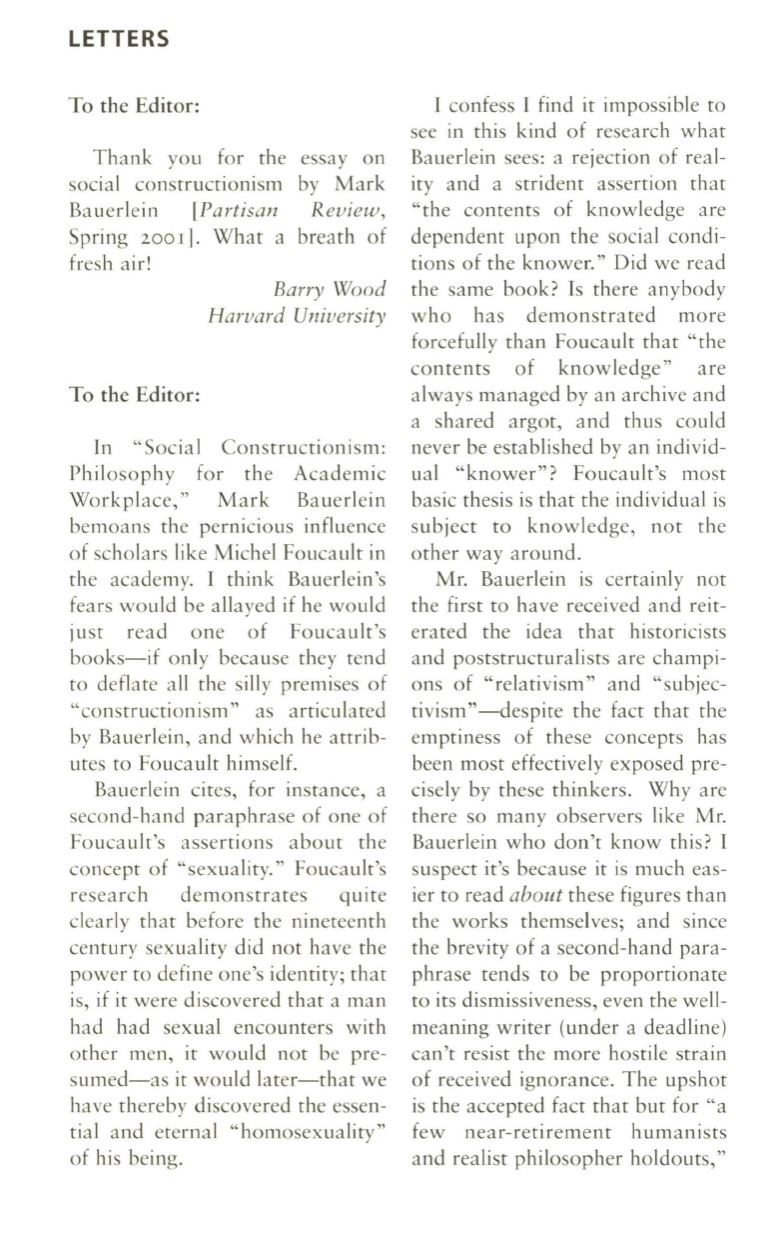
LETTERS
To the Editor:
Thank you for the essay on
social constructionism by Mark
Bauerlein
I
Partisan
Review,
Spring
200 I
I.
What a breath of
fresh air!
To the Editor:
Barry Wood
Harvard University
In "Social Constructionism:
Philosophy for the Academic
Workplace," Mark Bauerlein
bemoans the pernicious influence
of scholars like Michel Foucault in
the academy. I think Bauerlein's
fears would be allayed if he would
just read one of Foucault's
books-if only because they tend
to deflate all the silly premises of
"constructionism" as articulated
by Bauerlein, and which he attrib–
utes to Foucault himself.
Bauerlein cites, for instance, a
second-hand paraphrase of one of
Foucault's assertions about the
concept of "sexuality." Foucault's
resea rch
demonstra tes
qui te
clearly that before the nineteenth
century sexuality did not have the
power to define one's identity; that
is, if it were discovered that a man
had had sexual encounters with
other men, it would not be pre–
sumed-as it would later-that we
have thereby discovered the essen–
tial and eternal "homosexuality"
of his being.
I confess I find it impossible to
see in this kind of research what
Bauerlein sees: a rejection of real–
ity and a strident assertion that
"the contents of knowledge are
dependent upon the social condi–
tions of the knower." Did we read
the same book? Is there anybody
who has demonstrated more
forcefully than Foucault that "the
contents of knowledge" are
always managed by an archive and
a shared argot, and thus could
never be established by an individ–
ual "knower"? Foucault's most
basic thesis is that the individual is
subject to knowledge, not the
other way around.
Mr. Bauerlein is certainly not
the first to have received and reit–
erated the idea that historicists
and poststructuralists are champi–
ons of "relativism" and "subjec–
tivism"-despite the fact that the
emptiness of these concepts has
been most effectively exposed pre–
cisely by these thinkers. Why are
there so many observers like Mr.
Bauerlein who don't know this? [
suspect it's because it is much eas–
ier to read
about
these figures than
the works themselves; and since
the brevity of a second-hand para–
phrase tends to be proportionate
to its dismissiveness, even the well–
meaning writer (under a deadline)
can't resist the more hostile strain
of received ignorance. The upshot
is the accepted fact that but for "a
few near-retirement humanists
and realist philosopher holdouts,"


